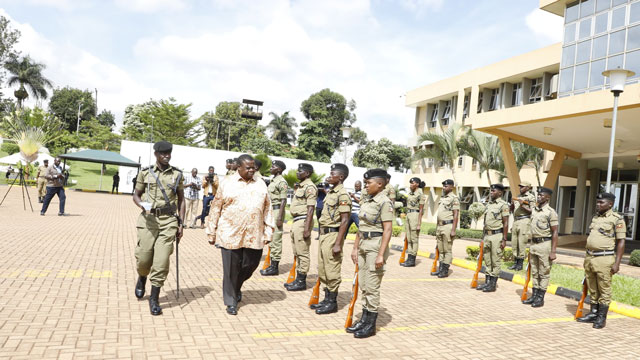
Kampala, Uganda | THE INDEPENDENT | A number of reforms proposed to promote the oversight role of citizens over the police have largely remained on paper. This is a key finding in a study conducted by the Network or Public Interest Lawyers -NEPTIL which examined recommendations of police reforms between 1986 to 2023.
The study looked at constitutional reforms as contained in the 1995 Constitution, looking at articles that establish the police and those that empower the public to play an oversight role.
The study further looked at recommendations by the 1986 Commission of Inquiry into human rights violations between 1962 and 1986 which was led by Supreme Court Judge Authur Oder, and the Justice Julie Ssebutinde led Judicial Commission of Inquiry into Corruption in the Uganda Police Force (1999 to 2000).
The study further examined the internal police reviews established as an avenue for internal reflection to redirect the institution to fullfill its constitutional mandate.
The findings of the study were presented at a symposium held on Friday at Hotel Africana. James Nkuubi, the lead researcher, says that during the period 1986 to 2023, a total of 265 reforms have been proposed. Of these, only six relate to promoting the oversight role of civilians.
Nkuubi says, some of these reforms concerning the people, included strengthening community policing, establishing an independent civilian-led institution to handle the recruitment process in the police, and have a police that is representative of the different ethnicities of Uganda.
“The commission (Ssebutinde commission) recommended that this independent body be composed of civilians with the mandate to advise the President on the appointment of the IGP and the Deputy IGP, and to recommend to him appointments and promotions of police officers above the rank of ASP…” the report states.
The Ssebutinde commission recommended upgrading of the entire Police complaints desk in terms of location, staff, and procedure, something the study says hasn’t been achieved as several police stations lack complaints desks, albeit with some efforts made by the police.
Nkuubi says that the only reform that seems to be operational , is a right given to the people, by the 1995 Constitution. Nkuubi says the people, individually and in associations have to an extent exercised these powers to check the operations of the police.
Dr. John Kamya, the Head of Curriculum and Doctrine Development at the Uganda Police says the police are serving the community to the best of their ability. He says the different recommendations suggested over the years can only be implemented if the interested parties, those that need the reforms to come to life, take an initiative to have them implemented.
He says the police works within in limits set by the law, making reference to the different powers that affect the operations of the police.
The police, which is required by the constitution to be independent has top officials appointed by the President, who is also the Commander in Chief of the force. The president commissions police officers and makes several appointments, and yet the president, also heads the executive arm of government under which the police falls.
Given this status quo, experts question what kind of service police is expected to deliver to the populace. The challenge thefore is to the public and the other players to cause for reforms to ensure the independence of the police.
The Member of Parliament for Butambala Muwanga Kivumbi says the challenges of holding the police accountable should be looked at in a broader spectrum of the political sphere in Uganda. He says even when the laws are amended to lay ground for the independence of the Police, the regime can abuse the law to serve their interests.
He makes reference to provisions of the 1995 Constitution which make it illegal to detain a suspect for more than 48hrs and detaining suspects in undesignated detention centers. The police has often violated the law in the two instances, hence Kivumbi saying that the law could still be abused.
To him, while it’s important to persue small progressive changes in police and other institutions, there should be a political force that seeks for a complete collective bargain with the state. And with this, he refers to the operations of people seeking for change in the general governance of the country.
Emmanuel Mutaizibwa, a journalist from Nation Media says that the public expects too much from the police.
He thinks, people should manage their expectations. He says the police can only do much given the current political environment.
Amidst militarisation of the police, Mutaizibwa says, the should be professional civilian institution of the police is rather dominated and indirectly led by the military. From taking charge of initially police work to appointing military men to the police, and giving them powers that subvert those of the professional police.
The study hence recommended that there should be, within parliament, a re-ignition of the discourse on the police reforms, an expansion of research into other international reforms recommendations and re-ignition and strengthening collective civil society Advocacy and oversight on police agencies.
****
URN
 The Independent Uganda: You get the Truth we Pay the Price
The Independent Uganda: You get the Truth we Pay the Price





